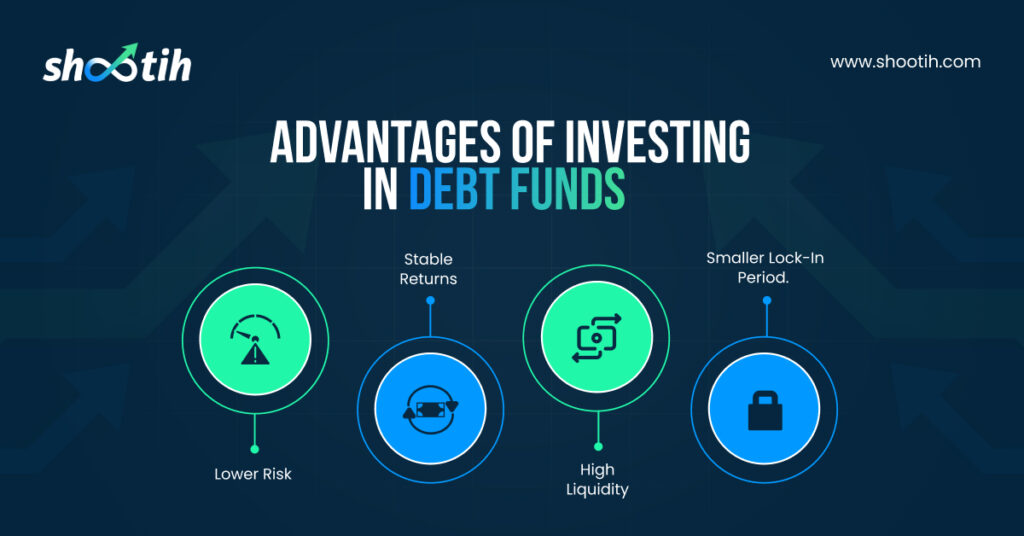For a business, it is quite critical to invest every penny carefully. While there are multiple instruments of investment, all of them are associated with some other risks. Let’s take an example of mutual funds for that matter, although mutual funds are emerging as popular investment instruments, they still have a lot of risks associated with them.
As a business owner, you would always want to make sure that you are growing your wealth substantially and at the same time keeping the risk low. Debt funds are popular mutual fund investments for businesses as they allow short-term capital parking, fixed rate of interest and relatively lower risk.
Debt Mutual Funds, also known as fixed-income funds, are a type of mutual fund that invests in financial securities like corporate bonds, treasury bills, government securities, paper, money market instruments, etc.
However, before investing in debt mutual funds, there are certain things that every business and corporate should keep in mind.
In this blog post, we will cover everything you need to keep in mind before investing in debt mutual funds.
Important Things To Consider Before Investing In Debt Mutual Funds:
The Risks:
This goes without saying, the first and most important thing to consider is the risk factor associated with debt fund investment. Although debt funds are usually considered to have a lower risk they are not risk-free. There are mainly two types of prominent risks that can occur with debt funds; interest rate risk and credit rate risk.
Interest Rate Risk:
To understand the interest rate risk, you first need to understand a simple relationship between bond price and interest rate. When a bond’s price increases, its interest rate decreases and vice versa. So the question is, why are interest rates and bond prices inversely related?
The value of the bond is marked to the market. Let’s assume that the investment manager holds the bonds at an interest rate of 8%. Now imagine a scenario where the RBI decides to lower interest rates of debt bonds by 1% per cent. So now there are bonds in the market with 8% and 7% interest rates. Naturally, more people would like to invest in bonds with higher interest rates and therefore the price of those bonds will increase.
Similarly, if the interest rate increases, the price of bonds decreases. Interest rate fluctuation is one of the primary risks of debt funds. The interest rate fluctuation risk is also directly related to the fund duration. The longer the duration of an investment, the higher the chance of interest rate fluctuations.
Credit Risk:
Credit risk refers to the risk of default. As we have discussed in our previous blog post “Debt Mutual Funds – What Are They And How Do They Work?”, in a debt fund, the issuer of the fund promises a particular interest rate to the investor. The default in paying the interest or principal amount or both is called credit risk. Credit risk is so much more serious than interest rate risk. The interest rate usually fluctuates in a cycle where the period of hikes in interest is followed by periods of falling interest rates. As an investor, you have time to recover from the market volatility caused by interest rates fluctuations if you have invested for a sufficient amount of time.
But the same is not the case with credit risk. Once the issuer has defaulted the payment, the price of the credit instrument will be written off permanently, causing an irreversible loss to the investor. To lower the credit risk, many independent agencies give a credit rating to different debt instruments based on their financial performance. The instruments with lower credit ratings usually have a lower price.
Other Factors To Consider:
Apart from these two major risks, there are also other factors to consider while investing in debt mutual funds. Some of these are listed below:
- Debt funds can be a substitute for bank fixed deposits but the two are quite different. There’s no guarantee that you will get the return on debt funds under any circumstances, while with bank fixed deposits, you can rest assured of getting guaranteed returns.
- If you are a business looking to save tax, you might want to consider tax implications on the income from debt funds. The taxability of different debt mutual funds might vary and you would want to make sure to invest in the debt funds with minimum tax implications.
- Keep in mind the expense ratio before investing in the debt instruments. The expense ratio is the cost charged by the fund managers to manage the fund. A common misconception about expense ratio is that the higher expense ratio ensures better fund management. But that’s not always true. Therefore, you need to consider the return and expense ratio before investing in the debt funds.
- It is always wise to allocate your money in different debt funds instruments like liquid funds, overnight funds, gilt funds, ultra short-term funds, etc., instead of allocating all your capital in a single fund.
Perks of Investing In Debt Funds

Now that we have thoroughly discussed the things to keep in mind before investing in debt funds, it would be unfair not to mention the perks of investing in debt instruments. There are certain perks of investing in debt funds that make them a suitable investment option for businesses:
Lower Risk:
Not denying that debt funds do have risks associated with them, however, the risk associated with the debt funds is much lower than the other types of investments like equity and hybrid funds.
Stable Returns:
If you are looking for periodic stable returns instead of one time returns, debt mutual funds are the perfect choice for you. If you have planned a specific financial goal, the stable return on the debt fund instrument can help you achieve that.
High Liquidity:
Liquidity refers to the ability to cash out your investments from the investment instrument. As compared to the other mutual funds, debt funds offer high liquidity. With debt funds, you can withdraw your investment whenever you need it the most.
Smaller Lock-In Period:
With certain debt instruments like overnight funds, liquid funds and ultra short-term funds, you get a shorter lock-in period and thus you can easily cash out your investments sooner than the other funds.
Debt funds are not all risky. They have the above-mentioned perks that can benefit the investors in multiple ways. Especially in the case of businesses, where every penny is earned through the extremely hard work of numerous people and every small amount of money can create a significant difference in day to day operations. Investing excess corporate cash in short term debt mutual funds can be ideal for businesses to avoid the risk associated with market volatility.
If you are a business looking to invest in debt mutual funds, Shootih can help you. Shootih is the best direct mutual funds platform that allows businesses to park their idle cash easily with various debt funds like overnight funds, short-term funds, ultra-short-term funds, etc.
You can explore our website or get in touch with us to know more about how we can help you to invest effectively.













